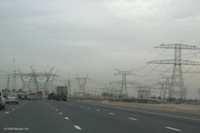Dubai to build the world's largest power plant
Electricity-hungry Dubai is planning to build one of the world's largest power and desalination complexes, a multibillion dollar plant.

The new plant would be capable of producing 9,000 megawatts of electricity and 600 million gallons a day of desalinated water, Dow Jones Newswires reported Thursday, citing people familiar with the project.
Dubai's planned mega-complex will sit next to Dubai World Central, intended to be the world's largest airport, and the giant Jebel Ali port and free zone where most of the emirate's power generation capacity of about 5,000 megawatts is presently located.
The completion date of the new plant has not been announced.
State-run utility Dubai Electricity & Water Authority, or DEWA, invited international engineering companies to bid by June 10 for an initial contract to advise on the plant's construction.
DEWA awarded contracts in March worth US$1.7 billion (euro1.26 billion) to South Korea's Doosan Heavy Industries & Construction and Italy's Fisia Italimpianti to build a new 1,330-megawatt power and 70-million gallon-a-day water desalination plant in Jebel Ali.
Based on these and other plants recently tendered, Dow Jones reported that the new complex could cost between US$12 billion and US$15 billion (euro11 billion) to build.
Wealthy Dubai, which sits in a nearly waterless desert, is one of the world's fastest-growing cities and among its most ravenous per-capita consumers of electricity and water. The city abounds with chilled swimming pools and giant air-conditioned homes and malls, one of which boasts an indoor ski slope.
Energy and water demand in Dubai are rising at rates of 11 percent to 18 percent a year, according to industry estimates, while the emirate's economy and population of 1.5 million continue to expand.
The large numbers of tourists flocking to Dubai are also adding to demand. The emirate attracted 6.5 million tourists last year and expects to greet 15 million by 2015, the government says.
The need for power and water is in turn pushing up demand for natural gas used to fire power plants. In June the Emirates will begin importing gas from Qatar through a just-finished pipeline. Dubai is also looking to Iran for energy. In April, the emirate and Iran signed a memorandum of understanding that could see Iran supply Dubai with electricity via a 180-kilometer (110-mile) underwater cable.
Dubai is one of seven emirates in the United Arab Emirates, which boasts the second-largest Arab economy after Saudi Arabia. Summer temperatures here can exceed 50 degrees Celsius (120 degrees Fahrenheit).
Persian Gulf countries, flush with cash from three years of high oil prices, are spending billions of dollars on new infrastructure and industrial projects to diversify their economies and create jobs for their fast-growing populations.
Subscribe to Pravda.Ru Telegram channel, Facebook, RSS!



